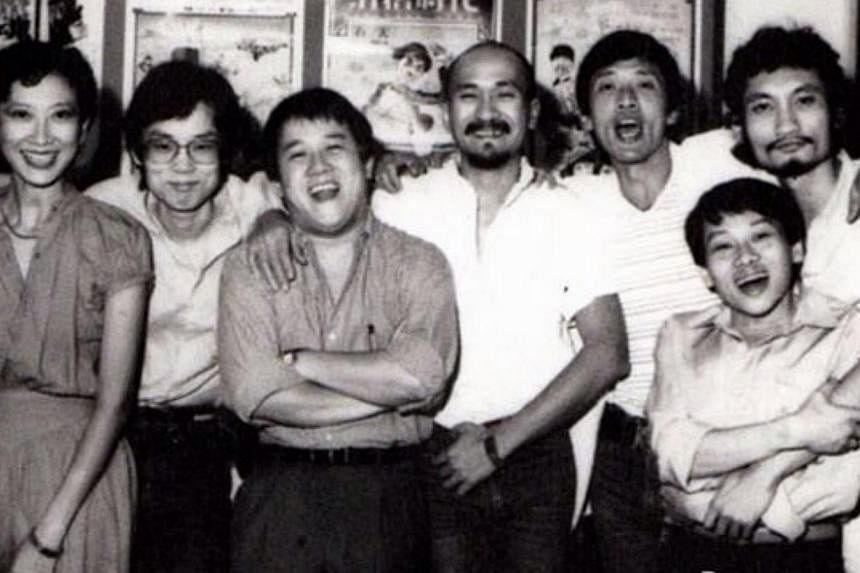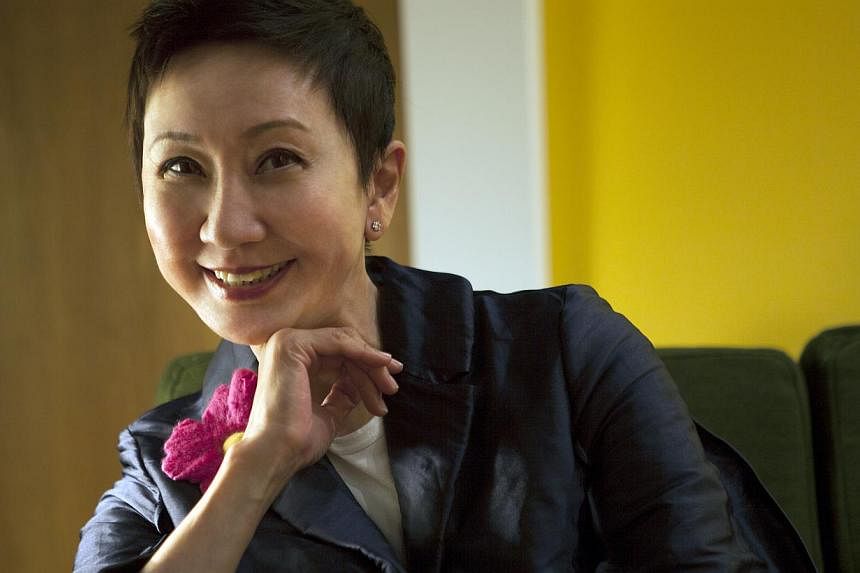Three years ago, a couple of hundred people - including the who's who of the Chinese film industry - got together to celebrate Hong Kong film producer Shi Nansun's 60th birthday at the Jockey Club.
An occasion like this is usually a magnet for the former British colony's notoriously aggressive paparazzi. But on that night, they were absent.
The press did not know. None of the guests breathed a word. Shi did not send a memo requesting privacy, but everybody got the message.
The incident shows the level of respect she commands in the Hong Kong film fraternity.
Probably the most accomplished producer in Chinese films, Shi's name is attached to a canon of screen gems: The Once Upon A Time in China martial arts series starring Jet Li, A Chinese Ghost Story with Leslie Cheung and Joey Wong, detective thriller Infernal Affairs with a star-studded cast that included Andy Lau and Tony Leung Chiu Wai and, more recently, Detective Dee And The Mystery Of The Phantom Flame headlined by Andy Lau, Carina Lau and Li Bingbing, and Flying Swords Of Dragon Gate with Jet Li and Zhou Xun.
She is now producing her first erotic film In The Room, directed by Singapore's Eric Khoo.
On the world stage, the 63-year-old more than holds her own too. Film trade magazine Variety named her as one of the 50 most influential independent film-makers in the world.
She has served on the jury of the world's top film festivals, including Berlin (2007) and Cannes (2011).
Last year, the French government made her an Officier de L'Ordre des Arts et des Lettres (Order of Arts and Letters).
Last month, the Locarno Film Festival honoured her with its Best Independent Producer award.
These are amazing accomplishments for someone who never set out to be in the movie industry.
"I got into the trade by accident," she says, dropping cubes of ice into her glass of Pinot Grigio because she likes it "really cold".
After successful stints as a communications executive and TV programmer, she was pondering her next career move in the early 1980s when she started hanging out with a bunch of Hong Kong film-makers including Dean Shek, Raymond Wong and Eric Tsang.
They liked her smarts, but she resisted their attempts to get her on board their film company Cinema City. So, they put money into her bank account.
"I called Raymond up and asked, 'What is this for?'
"And he said, 'Oh, we are paying you. When you are ready, come to work.' So the next day, I turned up for work."
That decision changed her life.
The career, she says, has kept her on her toes for the last three decades.
Smart, sassy and occasionally droll, the multilingual Shi (she is fluent in English, Mandarin, French, Cantonese and Shanghainese) is the third of four children.
Both her parents came from Chongming Island, at the mouth of the Yangtze River. They settled in Shanghai, but moved to Hong Kong when the communists took over China in 1949.
Her father rose above poverty and a lack of education to become a manufacturer of enamel ware.
Her mother was a book-loving housewife.
"She was educated and spoke English, which was really rare for a girl living in a village on an island. She taught my father Arabic numerals - he used to do everything on the abacus," she says.
Books - from Enid Blyton classics to Jin Yong martial arts novels - and films were very much a part of Shi's growing years.
"My mother took me to the movies often, and I would sit on her lap. She loved MGM musicals and films starring Rock Hudson, Doris Day, Troy Donahue and Natalie Wood," she says.
"In the evenings, my amah would take me to watch Chinese melodramas and operas starring Yam Kim Fai and Pak Suet Sin," she adds, referring to the Cantonese opera legends.
In 1967, when she was about to turn 16, Hong Kong was rocked by leftist riots.
"It was the beginning of the Cultural Revolution. My father was Shanghainese and very paranoid about communists coming along and taking away everything," she says.
Her parents sent her away to her godmother in Ghana, Africa, where there was a sizeable Shanghainese community. Her godfather found her an international school, but she asked to visit it first.
"There were just 13 students of nine nationalities. I thought to myself, 'If I stayed here, I won't get much of an education.' That was when I grew up. Before that, I was just a ditzy girl reading Seventeen and listening to the Beatles."
Shi decided to head for London instead, where she ended up in a boarding school for girls in Littlehampton, a small seaside town in the south of England.
She was the only Asian in the school but fitted in so well that she persuaded her folks to allow her to remain in England instead of joining her three brothers in Dallas, Texas.
After her A levels, she read statistics and computer science at the North London Polytechnic. Deciding on a career upon her return to Hong Kong took some time.
"I didn't want to be confined to a big, air-conditioned computer room," says Shi, who ended up in public relations firm Michael Stevenson.
In 1976, TV executives from broadcaster TVB invited her out for tea to discuss a programme on the Miss Universe pageant which was being held in Hong Kong.
"Actually, it was a screen test. They told me to pretend that I was going to interview a pageant contestant. So, I asked one of them, 'So, which country would you like to come from?'"
She was hired on the spot and took three weeks off work to film a daily programme called Diary Of Miss Universe.
Her resourcefulness and instinct for what makes interesting viewing quickly endeared her to production and crew members.
"You must be curious and pro-active. I didn't know anything about TV and I could sit there and just ask questions, but I wanted to know how they were going to use what we filmed, and how I could make that more interesting."
She acquitted herself so well that she was asked to host the finals with veteran compere Lau Ka Kin.
"I was young and fearless, so I said 'sure'," she recalls.
She discovered in the process that she was good at simultaneous translation, a skill which nabbed her a lot of live hosting gigs.
Fraternising with the creative talents in the TV industry culminated in her being offered a job at a new station called Commercial Television (CTV), and when that closed a month later, at Rediffusion TV (RTV) - the predecessor of Asia Television.
At RTV, she handled sales and publicity, and later, TV programming. She lets on that while she excelled in her work, she did not always like what she did.
"But my mother told me two things, 'Always be helpful' and 'Once you say yes, you have to be responsible'."
When RTV was sold to an Australian consortium in 1981, Shi, along with many of the station's creative talents, resigned. She deci-ded to take some time off to ponder her career options.
By this time, she was dating film-maker Tsui Hark, whom she met at CTV and married later.
The couple, who do not have any children, recently divorced, but remain friends and working partners.
Through Tsui, she met the founders of Cinema City, who wooed her to help them run the company. The early days of Cinema City, she says, were heady.
Although her main job was administration, she played a big role in its creative output, which inclu-ded hits such as Aces Go Places and Happy Ghost.
"We argued all the time, we fought all the time, but we got along," she says of her partners Shek, Tsang, Wong, Tsui, Karl Maka and Teddy Robin.
Her linguistic skills and resourcefulness made Shi more than an equal partner.
Armed with a production blue book, she would make calls around the world, hunting down car stunt maestros, special effects masters and other technical experts.
In 1984, she and Tsui founded their own production company, Film Workshop.
"Cinema City had become this big independent studio with certain quotas to meet. We were happy in this family in this huge mansion, but Tsui and I thought it would be nice to have our own gazebo out in the garden and do things which Cinema City might not want to do," she says.
The company was successful from the word go, churning out hits such as Shanghai Blues, The Swordsman and the John Woo gangster flick A Better Tomorrow, starring Chow Yun Fat, Leslie Cheung and Ti Lung, and which was the highest grossing Hong Kong movie at one time.
Shi's reputation as a producer par excellence grew, and she was constantly wooed by big media companies.
She helped to turn Media Asia, where she produced Infernal Affairs, into a major production company, and has also worked with the JA Group and Irresistible Films.
In 2008, she founded and became the chairman of Distribution Workshop with film veteran Jeffrey Chan. The company has had a string of critical and commercial successes, including A Simple Life, which won Deanie Ip the Best Actress award at the Venice International Film Festival in 2011, Taiwanese gangster film Monga and Hong Kong crime thriller Overheard.
She says that because the film industry has given her so much, she tries to give back. Besides promoting new film-making talents, she has also served and still serves on various media boards in Hong Kong, China and Singapore.
"Some of these things are political and bureaucratic, and you almost have to jump up and down and kick people in the face before things get done.
"But if I can make a difference, I will try," says the former international consultant for the Media Development Authority here.
Singapore, she says, should do more to develop people who are idea-makers.
"There is a shortage of people such as good scriptwriters who can create ideas with emotional resonance and which can cross boundaries," says Shi, who sits ramrod straight throughout the two-hour interview, thanks to years of deportment classes in boarding school.
After more than three decades in the business, she now wants to channel more of her energy into doing things she has never tried before. That is why she has hooked up with Khoo to produce her first erotic film In The Room.
Set in a hotel room over a few decades, the film revolves around several tales of love, loss and lust.
"Sex, like food, is a big part of our lives. But while there are recipe books and TV programmes on food, people don't talk about sex so much. Eric and I met several years ago and we liked each other very much, and I believe he has the sensibility to carry this off."
Without any affectation, she says there are several reasons she has lasted so long in the business.
"You have to always be learning, you have got to keep increasing your knowledge. And as a pro-ducer, you also have to be very open-minded. There is never just one way of doing things."
But nothing works better, she says, than sincerity.
"You have to be totally sincere in how you treat someone. I always try, although I don't always succeed, to put myself in the other person's position," she says.
"And you have to stand by your word. It sounds corny, but if you say it and you really are able to do it, then you have got it."



